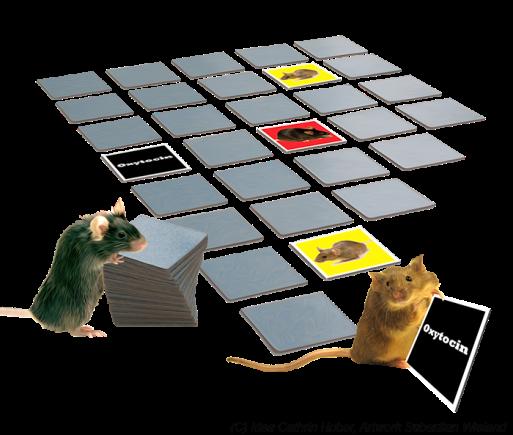

Social recognition in rodents bears similarities to the "Memory Game"
© Idea Cathrin Huber, Artwork Sebastian Wieland.
Social recognition requires the perception of relevant social cues and the identity of others to elicit proper responses. Problems in the early perception of social information will impact consequently subsequent stages of information processing and eventual social responses.
Hans Asperger, a pediatrician after whom one form of autism is named, had already highlighted altered sensory perception as a hallmark of the disorder. These alterations in sensory processing have gained progressively more attention in the last few years and are now also added to the latest revision of the American diagnostic research criteria.
Neuronal processing underlying social interaction can be affected at different levels. The neuropeptide Oxytocin has turned out to be a key modulator in the perception of others as research groups at the Central Institute had shown in the last years.
Oxytocin is tested in many studies for instance to support psychotherapy trying to alleviate deficits in the recognition of interpersonal interactions. The mechanisms have however not been entirely clarified how Oxytocin modifies the perception of social cues.
Scientists around the Neurobiologist Lennart Oettl and the Psychiatrist and Neurophysiologist Dr. Wolfgang Kelsch (Department of Psychiatry and Psychotherapy, Head of the Research Group of Developmental Biology of Psychiatric Disorders) now revealed a mechanism in mice how Oxytocin can modulate the perception and later recognition of other individuals.
Just like most animals, mice use primarily olfactory cues for social recognition. The scientists found that Oxytocin released from the brain improves the signal-to-noise in sensory information processing. Oxytocin activates so-called top-down projections from the cortex down to sensory networks where the top-down inputs drive inhibitory neurons.
This top-down drive of inhibition improves signal quality in the sense of attentional filtering. The modified sensory information is then propagated to higher cortical areas. Through this mechanism, Oxytocin modifies the processing of social cues and improves later recognition of other individuals.
„It is a little bit like playing the game Memory where you have to sharpen your senses on distinguish similar objects and later remember them when they appear again. Oxytocin seems to promote these two aspects in social recognition“, explains Wolfgang Kelsch. This means that Oxytocin sets the sensory processing network in a particular state for the efficient processing of social cues.
Oxytocin acts at multiple levels of the processing of social cues. The present finding highlights that Oxytocin’s actions early in the information stream will impact downstream processes. The here described mechanisms could also apply to psychiatric disorders and explain some of the altered perception observed with autism, and, as recent studies in humans show, potentially serve as a starting point for more objective diagnostic criteria.
Publication:
Oettl LL, Ravi R, Schneider M, Scheller M, Schneider P, Mitre M, da Silva Gouveia M, Froemke RC, Chao MV, Young WS, Meyer-Lindenberg A, Grinevich V, Shusterman, Kelsch W (2016) Oxytocin enhances social recognition by modulating cortical control of early olfactory processing. Neuron (2016) http://dx.doi.org/10.1016/j.neuron.2016.03.033
Contact:
Dr. Wolfgang Kelsch
Heidelberg University, Medical Faculty Mannheim
Central Institute of Mental Health
J5, D-68159 Mannheim
Tel.: +49(0)621 1703 6213
E-Mail: wolfgang.kelsch@zi-mannheim.de
https://www.zi-mannheim.de/en/institut/communication-media.html















